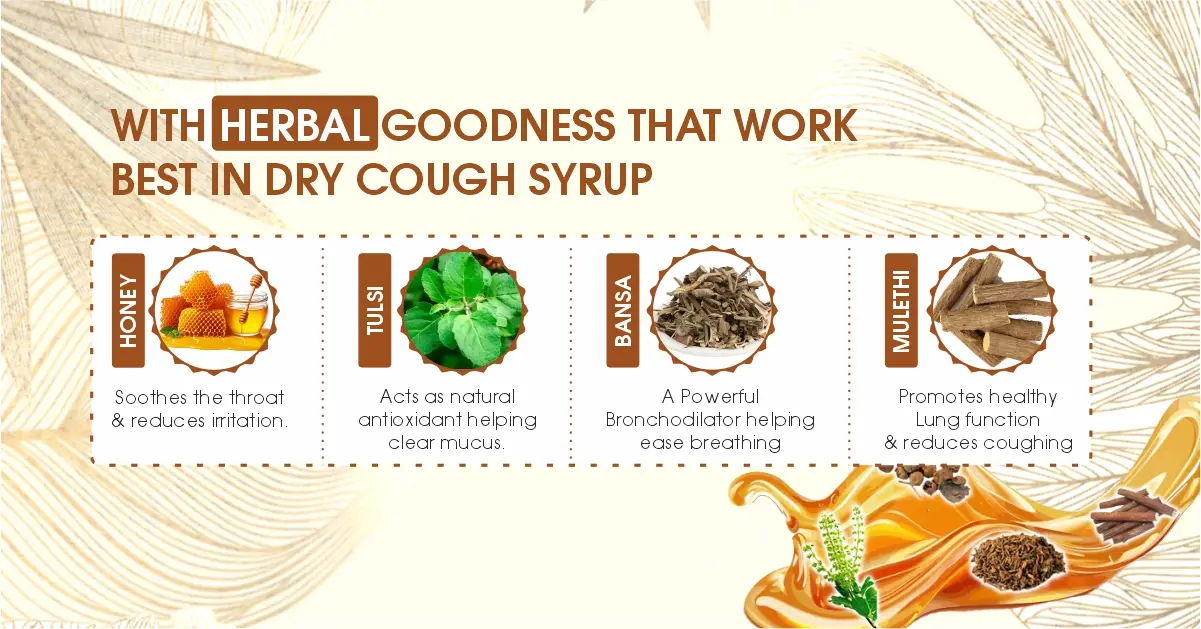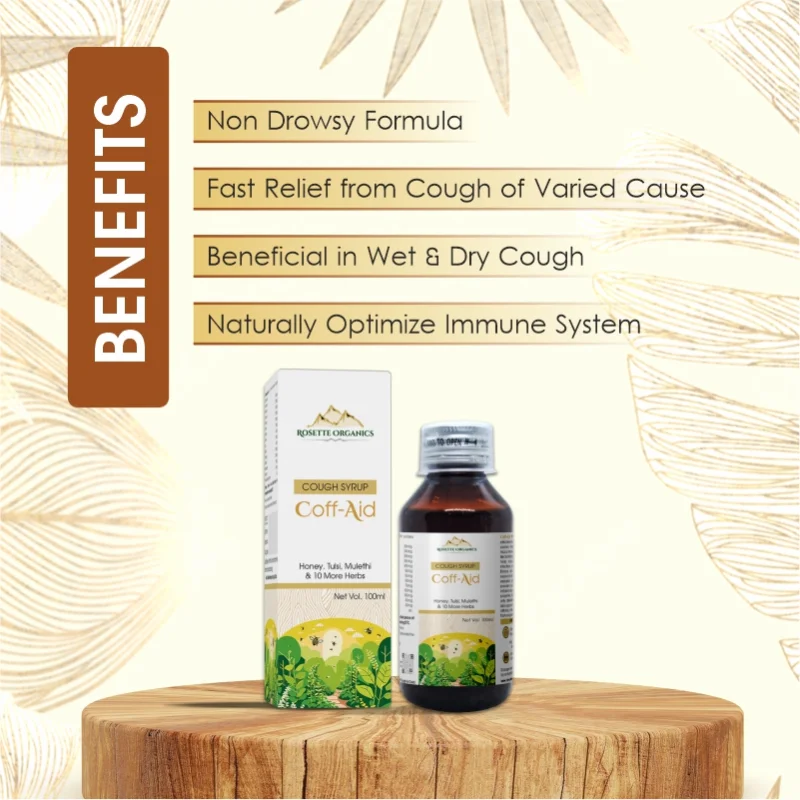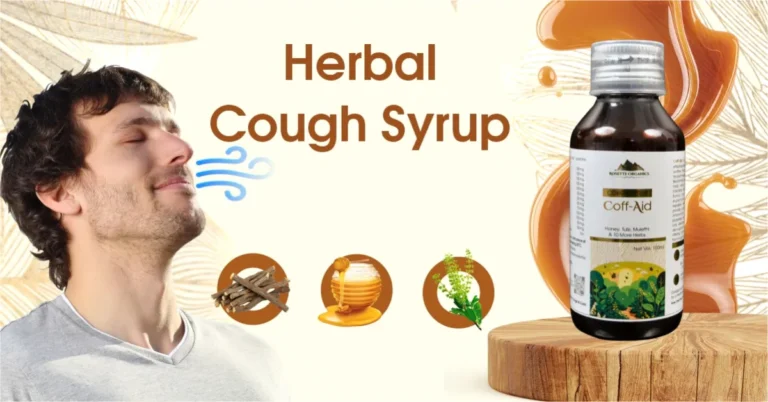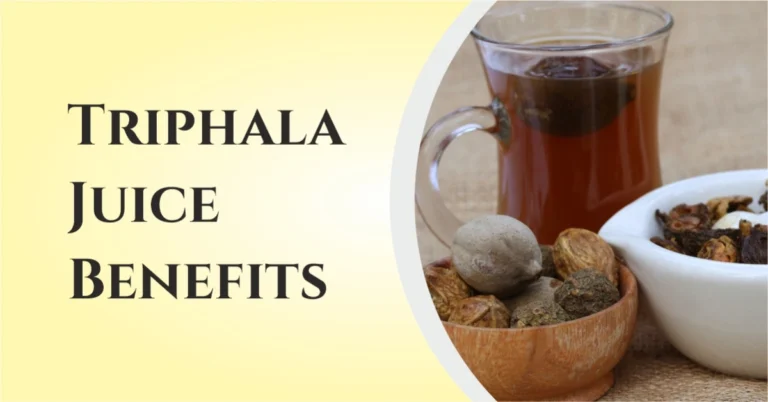Best Dry Cough Syrup for Fast Relief & Lasting Comfort
Dry cough is that stubborn, tickly feeling in your throat that makes you cough but brings up no mucus. It can disturb your sleep, strain your voice, and linger far longer than you’d like. Choosing the right dry cough syrup matters because it’s not just about silencing the cough—it’s about addressing the root cause and bringing real relief.
While allopathic syrups often work by suppressing the cough reflex, Ayurveda takes a gentler route, using herbs that soothe irritation, support your lungs, and strengthen immunity over time. The right choice can mean the difference between temporary comfort and lasting wellness.
What Is Dry Cough? (Modern & Ayurvedic View)
From a modern medical perspective, a dry cough is known as a non-productive cough—it doesn’t bring up mucus or phlegm. It’s often triggered by factors such as allergies, viral infections, asthma, or post-nasal drip. In many cases, it’s the body’s way of clearing throat irritation, but it can also be a lingering symptom after a respiratory illness.
In Ayurveda, dry cough is linked to an imbalance in Vata dosha, the energy that governs movement and air flow in the body. When Vata is aggravated, it can cause dryness in the throat and lungs, leading to irritation and a persistent urge to cough. This dryness can be worsened by cold weather, dusty environments, excessive talking, or eating foods that increase Vata, such as overly dry or cold meals.
Common Causes & Triggers of Dry Cough
Dry cough can start for many reasons, and often more than one factor is at play. Exposure to environmental irritants such as dust, smoke, and air pollution can dry out and inflame the throat lining, making you cough even without mucus.
Seasonal and weather changes—especially cold, dry air—can irritate the respiratory tract and aggravate sensitive airways. A dry cough may also linger after viral or bacterial infections, even when other symptoms have cleared.
Underlying conditions like GERD (acid reflux) and allergies can also trigger persistent coughing, as stomach acid or allergens irritate the throat and airways.
From an Ayurvedic perspective, dry cough is often connected to Aahar-Vihar imbalances—diet and lifestyle habits that disturb the body’s natural balance. Eating overly dry, cold, or processed foods, speaking for long periods without rest, and living in excessively dry environments can all increase Vata dosha and lead to cough-related discomfort.
When to Use Dry Cough Syrup vs Home Remedies
Knowing whether to treat a dry cough with syrup or stick to home remedies depends on the cough’s nature and severity.
Dry cough syrup is usually the better choice when:
- The cough has lasted more than a few days without improvement.
- Throat irritation is constant and interferes with speaking or eating.
- Night-time coughing keeps you from sleeping.
Home remedies can be enough when:
- The cough is mild and seasonal, often improving with rest and warmth.
- Simple measures like sipping warm water, drinking herbal tea, or inhaling steam ease the discomfort.
Ayurvedic signs that call for stronger intervention:
- Unusual dryness in the throat and chest.
- A coarse or strained voice.
- Discomfort or pain while coughing.
- Cough linked with fatigue or dryness in skin and lips — signs of aggravated Vata dosha.
In such cases, an Ayurvedic syrup alongside gentle lifestyle changes can help restore balance and speed up recovery.
Ayurvedic Ingredients That Work Best in Dry Cough Syrup

A good Ayurvedic dry cough syrup works because of its carefully chosen herbs and natural ingredients. These not only ease irritation but also strengthen the respiratory system and support immunity.
- Tulsi (Holy Basil) – Immune Support & Throat Soothing
Tulsi is valued in Ayurveda for its ability to fight infections and calm an irritated throat. Its natural oils help reduce inflammation, while its warming effect supports faster recovery from respiratory discomfort.
- Mulethi (Licorice) – Anti-inflammatory & Demulcent
Mulethi coats the throat lining, creating a soothing barrier that reduces dryness and irritation. It also has mild anti-inflammatory effects, helping to calm persistent coughing spells.
- Vasaka (Adhatoda vasica) – Expectorant & Cough Reliever
Vasaka is known for clearing the airways. It helps loosen and expel mucus while reducing cough frequency, making it especially useful when a dry cough starts turning productive.
- Pippali (Long Pepper) – Respiratory Strength Booster
Pippali gently stimulates the respiratory system, improving lung capacity and easing breathlessness. Its warming nature also helps balance aggravated Vata and Kapha doshas.
- Banaphsa, Ginger, Honey – Throat Coating & Antimicrobial
Banaphsa soothes throat irritation, ginger reduces inflammation, and honey forms a protective coating while fighting microbes. Together, they offer both comfort and protection against secondary infections.
Allopathic vs Ayurvedic Dry Cough Syrup – Which to Choose?
When choosing a dry cough syrup, it helps to understand how allopathic and Ayurvedic options differ in their approach, speed, and safety profile.
| Feature | Allopathic | Ayurvedic |
|---|---|---|
| Effectiveness | Works quickly by suppressing the cough reflex | Relieves irritation and addresses root causes like throat dryness and Vata imbalance |
| Onset Time | Fast-acting (within hours) | Gradual relief that builds with consistent use |
| Side Effects | May cause drowsiness, dryness in mouth, or digestive upset | Generally safe; occasional mild reactions if allergic to specific herbs |
| Suitability for Kids | Some formulas not recommended for children under a certain age | Many are safe for kids (check age-specific dosage) |
| Suitability During Pregnancy | Limited safe options; always needs doctor’s advice | Certain formulations may be safe under guidance, but still require consultation |
| Approach | Symptom suppression | Holistic balance and immune support |
For quick, short-term relief, an allopathic syrup might work faster. For long-term respiratory health and fewer side effects, Ayurvedic syrups offer a gentler, more sustainable approach.
How to Use Dry Cough Syrup Safely
Using dry cough syrup correctly ensures better relief and minimizes unwanted effects.
General Dosage Guidelines
- Adults: Usually 5–10 ml, 2–3 times a day, or as directed by a healthcare provider.
- Children: Dosage varies by age and product; always follow the label or a doctor’s advice.
Best Time to Take
- Preferably after meals to avoid stomach discomfort.
- Sip a little warm water afterwards to help the syrup coat the throat and work effectively.
Tusq DX Syrup Uses
- Tusq DX Syrup ka upyog sookhe khaansi (dry cough) mein hota hai, jo mucus ke bina hoti hai.
- Yeh cough reflex ko control karta hai, throat ki jalan kam karta hai, aur irritation ko soothe karta hai.
- Sirf doctor ki salaah par use karein, khaaskar bachon aur pregnant mahilaon ke liye.
Possible Interactions & Precautions
- Avoid combining with other cough suppressants unless advised by a doctor.
- People with chronic conditions like asthma, heart disease, or high blood pressure should seek medical guidance before use.
- Check for allergies to any herbal or non-herbal ingredients in the syrup.
Home Remedies That Work Alongside Syrup
Along with using a syrup for dry cough, simple home remedies can speed up recovery and make you feel more comfortable. These methods work well alongside Ayurvedic or allopathic syrups.
- Tulsi + Honey + Ginger Tea – Boil fresh tulsi leaves and crushed ginger in water, then add a teaspoon of honey once it cools slightly. This soothes the throat, reduces irritation, and supports immunity.
- Steam Inhalation with Ajwain – Add a spoon of ajwain seeds to boiling water, inhale the steam under a towel for 5–10 minutes. It eases airway dryness and helps relieve cough triggers.
- Salt Water Gargle – Gargling with warm salt water twice a day reduces throat inflammation and removes irritants.
- Warm Milk with Turmeric – A pinch of turmeric in warm milk works as a natural anti-inflammatory, calming nighttime coughing spells.
These remedies provide extra comfort while the syrup addresses deeper causes, making your recovery faster and more effective.

Coff-Aid – Fast-Acting Ayurvedic Dry Cough Syrup
Coff-Aid is an Ayurvedic dry cough syrup made with Somlata, Mulethi, Tulsi, Vasaka, and 9 other natural ingredients. It helps soothe throat irritation, reduce dryness, and support overall respiratory health without side effects.
FAQs
Which is the best ayurvedic dry cough syrup?
A syrup with herbs like Tulsi, Mulethi, Vasaka, and Honey works best; Coff-Aid is a good example.
Can kids take dry cough syrup?
Yes, if it’s age-appropriate and the dosage is as per a doctor’s advice.
Is dry cough syrup safe during pregnancy?
Some Ayurvedic syrups may be safe, but always consult a doctor before use.
How long should I take it?
Usually 3–7 days or until symptoms improve; follow label or doctor’s guidance.
Can I combine syrup with home remedies?
Yes, warm fluids, steam inhalation, and herbal teas can enhance relief.
Which syrup is best for dry cough?
One that soothes the throat, reduces irritation, and has minimal side effects
What is the best medicine for a dry cough?
Choice depends on cause; Ayurvedic syrups are gentle, allopathic ones act faster.
Which thing is best for a dry cough?
Warm liquids, a soothing herbal syrup, and rest help most people recover.







